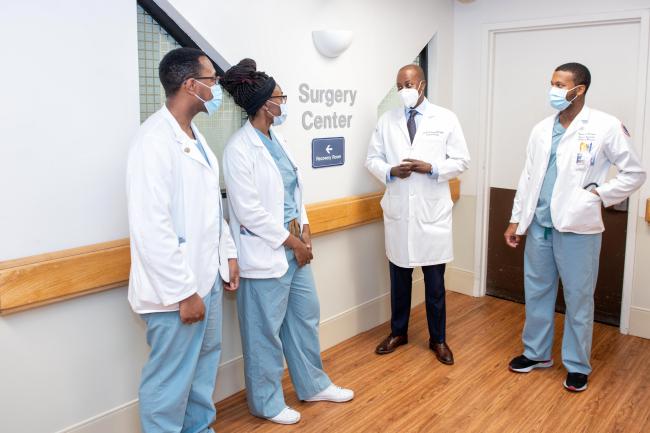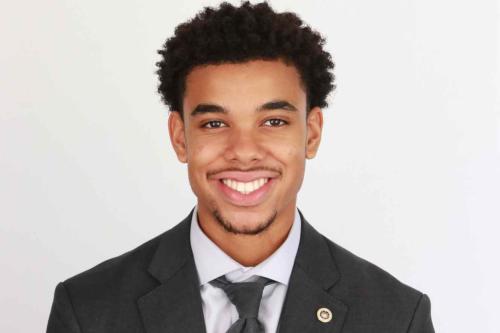If there is one place in the United States uniquely qualified to speak at the intersection of health disparities and systemic racism, it’s the Howard University College of Medicine.
The Howard University College of Medicine was created in response to the large number of newly freed Black people migrating to Washington, D.C. among the backdrop of a post-Civil War America. According to the college’s history, “The founders of the college recognized that the nearly overwhelming health care needs of this population and of other [B]lacks throughout this country would be best met by training students to become highly competent, compassionate physicians who would deliver care in communities having a shortage of health personnel.”
Almost by necessity, Howard and its College of Medicine have remained the vanguard of medical education. For its first 100 years, Howard — along with Meharry Medical College in Nashville, Tennessee — trained most of the African American physicians in the country since many predominately white institutions refused to accept Black students. Even today, the 4,000-plus College of Medicine alumni comprise a large percentage of the practicing Black physicians nationwide, proof that the college continues to fulfill its mission of producing global leaders in medicine dedicated to addressing health care disparities.
However, there has been recent pushback from conservative legislators, educators, and even medical personnel regarding the merits of including concepts of systemic racism and health disparities in medical school curricula. After the American College of Surgeons (ACS) appointed a task force to evaluate how best to address structural racism within their field, a former member wrote a Wall Street Journal op-ed declaring critical race theory “bad medicine” and “the latest political quackery.”
These arguments presume that medical racism does not exist, or is at least a bygone practice. However, present-day tragedies like the COVID-19 pandemic undermine those claims. A 2021 Kaiser Family Foundation report revealed that a substantial share of the Black population expressed skepticism about the COVID-19 vaccinations, in large part due to their distrust in America’s health care systems. Howard and the College of Medicine were at the forefront of testing and vaccination efforts across the District of Columbia, earning plaudits from the federal government.
“It’s very important for Howard University Hospital and Howard University to be a trusted source for the care that [Black and Brown communities] need,” said Howard University Hospital Chief Executive Officer Anita L. A. Jenkins in 2021. “We need to be able to say to the community that we serve and to anyone who needs our care that yes, it is safe, look at us.”
Similarly, in 2020, the College of Medicine launched the 1867 Health Innovations Project with the goal of transforming and improving health care in medically- underserved communities. The cutting-edge technology and innovation program collaborates with medical researchers, innovators, entrepreneurs, and corporate partners to tackle health challenges confronting underserved populations in the Washington, D.C. area.
The 1867 Health Innovations Project has yielded a strategic partnership with AARP Innovation Labs, where they will pilot technology projects for diabetes, hypertension, cardiovascular disease, genetic disorders, cancer, and neurodegenerative diseases.
“The critical gap related to life expectancy, chronic disease, and access to technology is an unacceptable reality,” said Michael Crawford, Howard University associate dean for strategy, outreach, and innovation. “1867 is set to play a pivotal role by augmenting faculty and student’s training, research, and understanding of disruptive solutions.”
As conservative voices discredit the inclusion of systemic racism and health disparities in medical school teachings, Howard’s College of Medicine is a beacon for why these conversations remain necessary. “The school not only encouraged advocacy on the community and federal levels, but expected it of students,” wrote College of Medicine alumna Diana M. Cejas, MD, MPH, a current child neurologist at the Carolina Institute for Developmental Disabilities. “Education about health issues that disproportionately affect minorities, including the effects of systemic racism on health, was ingrained in the curriculum.”
“Being Black in health care was normalized, respected, and celebrated,” Cejas said.
“A host of studies show that Black patients feel more comfortable when cared for by Black physicians and are more likely to engage in treatment decision-making,” said Adetomiwa Victor Owoseni, a 2018 Howard alumnus. “Two studies from 2018 and 2019 found that Black physicians more often choose to both work in and pursue research that benefits underserved communities. Additionally, Black physicians act as critical role models for young Black students, who, like me, dream of one day caring for patients too.”
Although predominantly white medical schools have opened enrollment to Black students since the 1960s, the Howard University College of Medicine has only evolved in its commitment to service and justice in its 155-year history. They continue to consistently graduate the most Black physicians every year nationwide. Students of the College of Medicine have joined forces with other businesses such as the AARP in a fight for justice for medically underserved patients.
That commitment is what continues drawing students to the Howard University College of Medicine.





